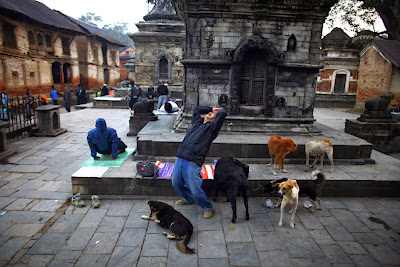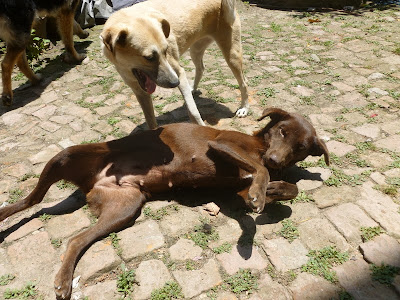 |
| No smoking,and no weapons in the polling booth. In case you weren't sure. |
Of course, it's always possible that this time around, the people elected for this version of the 601-person team assembled to write the Constitution will actually write a Constitution. Heck, it's only been five years of not-writing so far. Eventually the folks in the Constituent Assembly (when it meets) will get tired of back-stabbing, tripping each other up, and holding their breath until they turn blue. Right? After all, Western donors have prepared them so well with junkets (whoops, I mean training trips) to Washington DC to see politics in action.
Wait. Let me think about that.
Wait. Let me think about that.
But here's the thing. Even though the enthusiasm level is in the doghouse ...
and even though NO TRAFFIC was allowed on election day ANYWHERE IN THE COUNTRY, meaning no cars or buses or motorbikes from 5 a.m. until midnight by order of the government, so that any of Nepal's 12 million registered voters who felt like casting a ballot had to walk to the polls like this ...
and even though NO TRAFFIC was allowed on election day ANYWHERE IN THE COUNTRY, meaning no cars or buses or motorbikes from 5 a.m. until midnight by order of the government, so that any of Nepal's 12 million registered voters who felt like casting a ballot had to walk to the polls like this ...
 |
| Kathmandu street on Election Day |
 |
| Temple doubled as polling place near my home |
That's right. Compared to the US's measly 57.5 percent in 2012.
In Kathmandu, where people tend to actually live where they're registered, the turnout was 75 percent.
That's in contrast to the rural areas where a lot of people are officially registered but really live in Kathmandu or work in Malaysia or the Persian Gulf, and there are no absentee ballots, so if people want to vote they have to return to their home villages like players in some kind of mass Christmas pageant, and then the decree went forth that all the world may vote, but only from the house of thy parents, except Nepalis take buses instead of donkeys. If you want to vote at a place not your parents, you have to prove you really moved by getting a Migration Certificate to show you have a Permanent Residence that isn't mom and dad's, even 20 years later. And no, a driver's license or a lease won't "prove" it. The teashop owner below has lived in Kathmandu for 22 years, but could only vote by going back to Biratnagar, a 14-hour bus ride. And of course if you live where you're registered but it's mountainous and remote, the walk to the poll might be as long as five hours. Although that beats several days on multiple buses, followed by walking.
"Ease of voting is a factor in rates of voter turnout," the ever-helpful Wikipedia informs us. Which suggests that if Nepali voters didn't have to take arduous rides on buses that might have bombs tossed at them, or weren't busy building World Cup stadiums in Qatar and sometimes dying in the heat to earn money for a better life back in Nepal, the voter turnout would be what? Ninety percent?
In Kathmandu, where people tend to actually live where they're registered, the turnout was 75 percent.
That's in contrast to the rural areas where a lot of people are officially registered but really live in Kathmandu or work in Malaysia or the Persian Gulf, and there are no absentee ballots, so if people want to vote they have to return to their home villages like players in some kind of mass Christmas pageant, and then the decree went forth that all the world may vote, but only from the house of thy parents, except Nepalis take buses instead of donkeys. If you want to vote at a place not your parents, you have to prove you really moved by getting a Migration Certificate to show you have a Permanent Residence that isn't mom and dad's, even 20 years later. And no, a driver's license or a lease won't "prove" it. The teashop owner below has lived in Kathmandu for 22 years, but could only vote by going back to Biratnagar, a 14-hour bus ride. And of course if you live where you're registered but it's mountainous and remote, the walk to the poll might be as long as five hours. Although that beats several days on multiple buses, followed by walking.
"Ease of voting is a factor in rates of voter turnout," the ever-helpful Wikipedia informs us. Which suggests that if Nepali voters didn't have to take arduous rides on buses that might have bombs tossed at them, or weren't busy building World Cup stadiums in Qatar and sometimes dying in the heat to earn money for a better life back in Nepal, the voter turnout would be what? Ninety percent?
But people voted in spite of potential "voter turnout dampening factors" that included at least one explosion (with two people injured) in Kathmandu the night before the election, and another one that went off outside a Kathmandu polling place during the voting and injured three people, including the eight-year-old boy who picked up the bomb thinking it was a toy. Here are some writeups from BBC, Al Jazeera and Agence France Press which give confirmed details. We've seen reports of other bombs and IEDs in the Nepali language press, and if you hang out for a while in any shop, everyone has a friend who saw a bomb or heard a bomb and is absolutely certain about it. Some of it might even be true.
And yet ... 70 percent. And not all of them are really votes cast using the name and voter I.D. of someone working in Qatar who has no idea he just voted. Pretty impressive, Nepal. Now if that Constitution can just get written ...
Here are a few shots from election day while I was bicycling around the 'hood on the beautifully clear-except-for-soccer-ball roads:
 |
| Above: Posters for a mainstream Maoist candidate. Yes, we differentiate here between mainstream Maoists and splinter Maoists. Below: U.N. observer takes picture of other U.N. observer. |
 |
There's no John King and his Magic Board in Nepal, and no projections coming up at the top of the hour, so there's also no sitting around the TV waiting for the results to be announced. Counting starts today, by hand, of the votes cast by the roughly 8.4 million people who walked through shuttered streets, braved the pre-election strikes to take buses to their villages beforehand, trekked for hours over the mountains, and hobbled by cane to the polls to cast their votes ... in spite of being utterly disgusted and discouraged by Nepal's dysfunctional democracy.
One of these years, I hope they win.
One of these years, I hope they win.




















